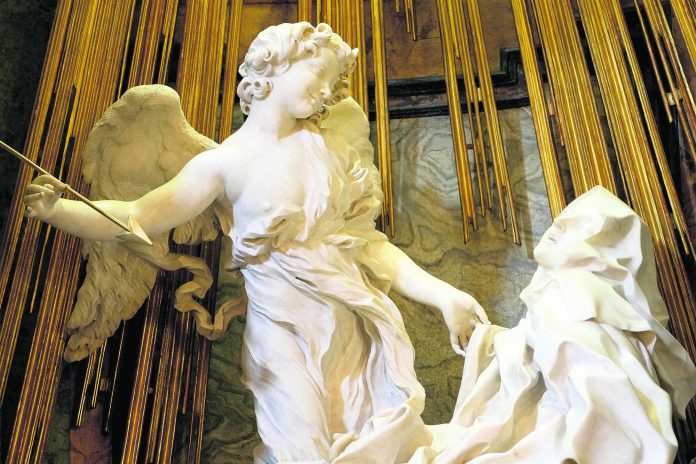
Associated Press
ROME (AP) — A chapel in a Rome church that is home to a Baroque sculptural masterpiece by Gian Lorenzo Bernini has been made even more dazzling after restoration.
Art and restoration specialists presented the result in the Cornaro Chapel in St. Mary of the Victory Church on Thursday. The chapel’s centerpiece is one of Bernini’s most celebrated sculptures, depicting the mystical experience of St. Theresa of Avila.
Known as the “Ecstasy of St. Theresa,” the marble statue is a theatrical centerpiece illuminated by rays of sunlight streaming through an opening. During the restoration of the 17th-century work, specialists removed incrustations on the glass that filters the light, rendering the scene even more dramatic.
Afternoon shafts of sun that pierce a small dome in the chapel accentuate the effect of Bernini’s sculptured golden rays. The saint is depicted wrapped in sculpted, wrinkled robes and radiates such fervor in her encounter with her God in Paradise that her enthusiasm is often taken for eroticism.
The restoration included cleaning all surfaces and reviving colors in frescoes near the ceiling, thanks in part to the removal of traces of black soot from a fire in 1833 in the church.
Restorers said they were able to determine that work done in 1915 to replace the original glass that had deteriorated appeared faithful to the original colors. They found fragments of the original framing of the glass and some fragments dating to the 17th century, possibly part of the original glass.
The chapel is a tourist favorite, and it appears Bernini was partial to it, too. He described his dramatic rendering of the chapel as “his least bad” work.
An architect, sculptor and painter, Bernini left his mark in Rome with other works, including the baldaquin, a majestic, ornate canopy over the central altar of St. Peter’s Basilica, and the playful, monumental “Four Rivers” fountain in Piazza Navona.



















